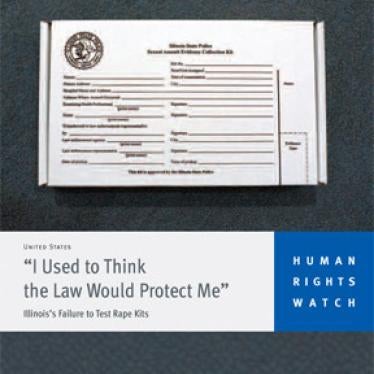Carrie was a high school student when she was raped in an alleyway by her home in northern Illinois. The man was a friend of her father's.
Immediately after the rape, Carrie went to the local hospital to have her body examined for DNA evidence, which was collected into a "rape kit." When the police came to the hospital to interview her, they indicated that they had previously picked up the individual in question-for sexually assaulting the teenage daughter of a family friend. The police took Carrie's rape kit with them when they left the hospital.
Carrie assumed the police would conduct the DNA test, but she didn't hear back from them. At first she called once a day, eventually calling only once a month. Six months after her rape, the prosecutor who reviewed her case finally called. The prosecutor said she was leaving the case open, but "didn't have any evidence to move it forward."
Carrie asked about her rape kit, and was informed that it had not been tested because her case "would not be a strong candidate for prosecution." When she asked why, she was told: "It is too hard to prove that what happened to you was rape. You may think it's rape, but it's your word against his."
In Illinois, roughly 80 percent of rape kits remain untested, according to figures compiled by Human Rights Watch. Our exposure of this backlog inspired the state attorney general, Lisa Madigan, to champion new legislation, signed into law in July, making Illinois the first US state to require sending every rape kit to the crime lab for testing. While the labs will need extra resources to handle the flood of kits, this is an important step.
After the prosecutor told Carrie that her rape wasn't a priority, Carrie requested the police file in her case. She was provided with a redacted version, which indicated that the police had not interviewed the suspect or other potential witnesses, nor considered the hospital examiner's report, which indicated "vaginal swelling and tearing consistent with forced penetration."
As far as Carrie knows, her rape kit continues to sit in police storage, untested.
Testing rape kits offers massive benefits - from the exoneration of innocent suspects to the identification of a perpetrator.
Yet across the country, testing this key DNA evidence isn't a priority. According to the CBS News chief investigative correspondent Armen Keteyian, police offices in Detroit have 5,600 untested kits; Houston has 3,800; Albuquerque has 1,100, and San Antonio 5,100. At least 12 major US cities, from Phoenix to Columbus, say they have no idea how many rape kits languish untested in storage.
National studies show that cases in which rape kits were tested were more likely to proceed through the criminal justice system and lead to arrests. For example, once New York City began testing all rape kit evidence, its arrest rate for rape rose from 40 percent to 70 percent.
Compare this with other rape statistics from around the country. National FBI data show that in 2008, only 22 percent of reported rapes led to an arrest -- far lower than the national arrest rate for murder, at 79 percent. And Illinois has one of the country's lowest arrest rates for rape -- only 11 percent.
For our report on Illinois' failure to test rape kits, "I Used to Think the Law Would Protect Me," Sarah Tofte, the researcher, analyzed data provided to us in response to public record requests, complementing the interviews we did with victims, law enforcement, and rape experts. Unfortunately, several major Illinois jurisdictions completely ignored our record requests.
Many of the responses from other jurisdictions around the state showed an alarming failure to protect the privacy of victims. Some jurisdictions erroneously sent us the addresses, telephone numbers, and social security numbers of victims and suspects in response to our requests. Several agencies sent the private information of juvenile victims.
Blunders like these are further indication that Illinois does not treat rape, or rape survivors, with the commitment it should.
Since bringing this information to light, Illinois took a significant step in the right direction by passing the law mandating that all rape kits go to labs for DNA testing. The next step: ensure funding for the labs, giving them the resources to examine the kits.
Pressuring local government and police departments has proven effective. In 2009, we uncovered more than 12,500 untested rape kits in Los Angeles, which compelled the Los Angeles Police Department to begin requiring timely testing for every rape kit.
Ultimately, we want testing every rape kit to become a national priority. Human Rights Watch is pressing the US government to implement federal legislation and oversight, to help eliminate the rape kit backlog. By making DNA testing a priority, this type of legislation will help to apprehend and bring cases against rapists and to offer justice to women like Carrie.
You can help us bring rapists to justice by urging your representative in Congress to support the bipartisan Justice for Survivors of Sexual Assault Act, which will require law enforcement to make testing rape kits a priority.


